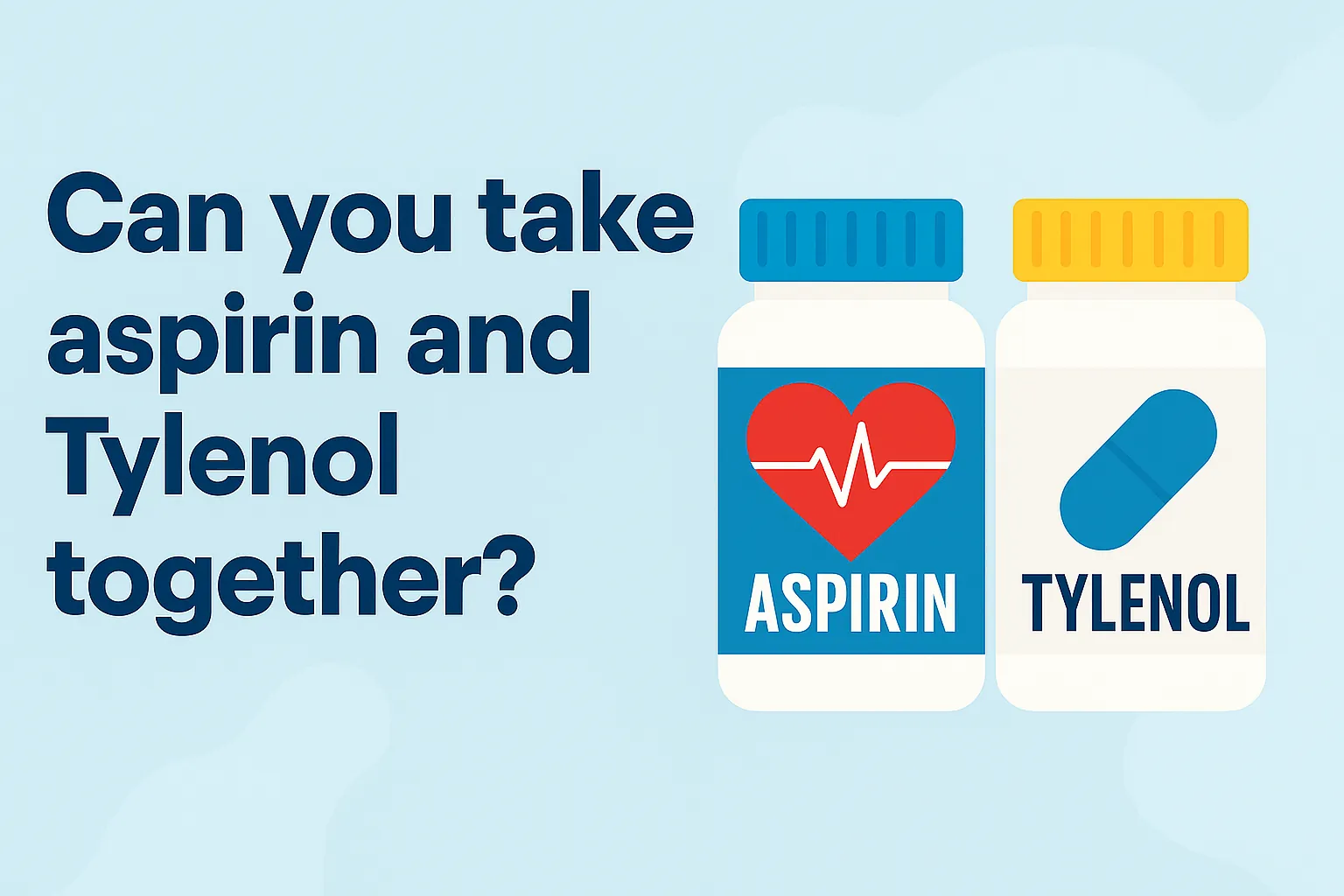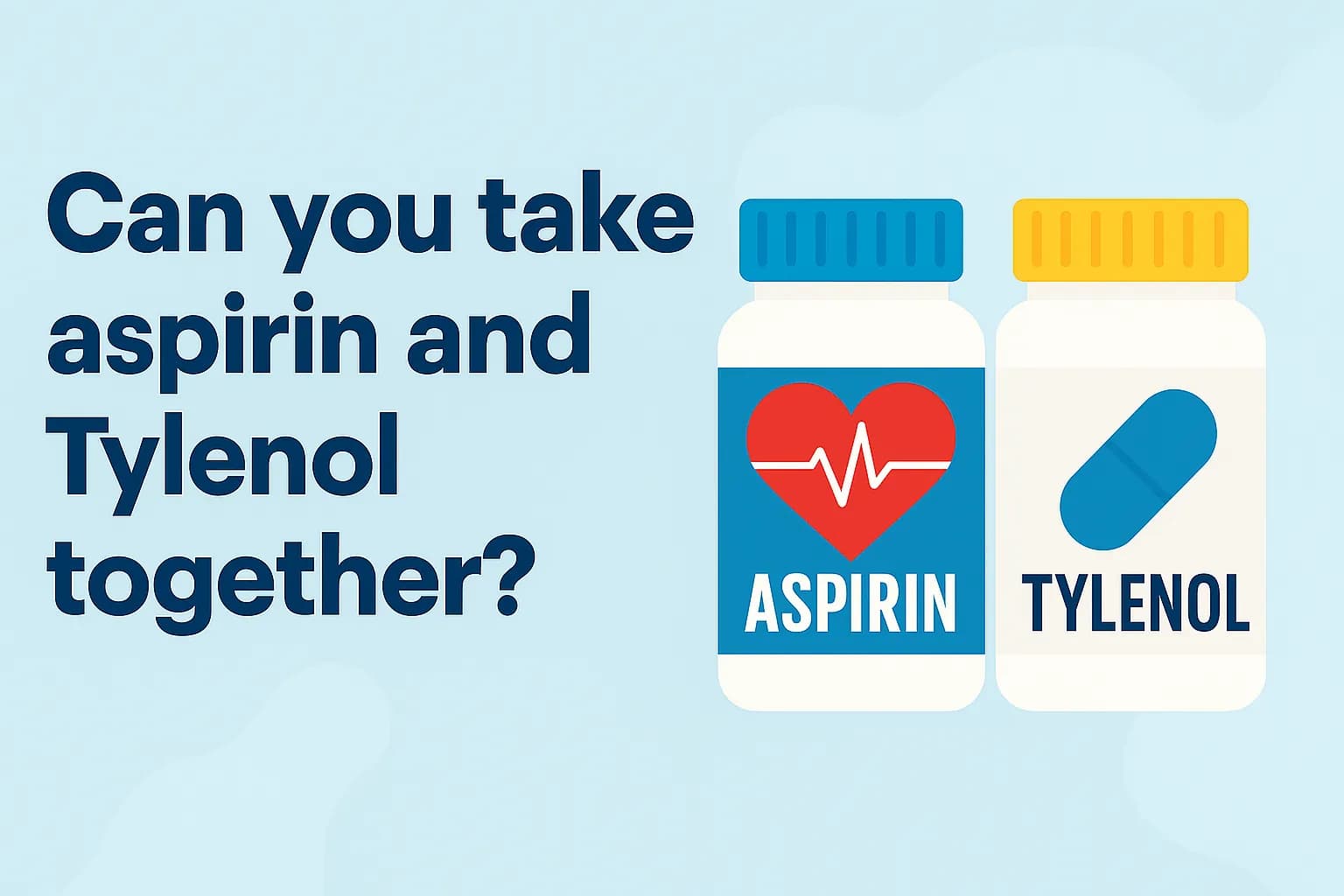Can you take aspirin and Tylenol together?

High blood pressure (hypertension) places stress on your arteries and circulatory system, increasing your risk of heart attack, stroke, and heart disease. You may wonder if aspirin can help lower blood pressure. The answer is more complicated than you might think.
Some studies have shown that low-dose aspirin (81 mg per day) may lower blood pressure when taken before bedtime. Other studies, however, observed no change in blood pressure with daily aspirin therapy. As a result, low-dose aspirin is not recommended as a blood pressure control medication. Many other drugs have proven effectiveness in lowering blood pressure, including:
- Beta‑blockers such as Lopressor (metoprolol), Coreg (carvedilol), Tenormin (atenolol)
- ACE inhibitors such as Zestril (lisinopril), Vasotec (enalapril), Lotensin (benazepril)
- Thiazide diuretics such as hydrochlorothiazide (HCTZ)
- Angiotensin II receptor blockers (ARBs) such as Cozaar (losartan), Diovan (valsartan)
- Calcium channel blockers such as Norvasc (amlodipine), Cardizem (diltiazem)
While aspirin may not lower blood pressure on its own, its blood‑thinning effect can benefit some people with hypertension by reducing clot risk. Below is important information about hypertension and aspirin.
What is hypertension?
Hypertension occurs when blood exerts too much force on artery walls. If systolic pressure is consistently above 130 mm Hg or diastolic above 80 mm Hg, you have high blood pressure. Hypertension increases risk for:
- Stroke
- Heart failure
- Peripheral vascular disease
- Coronary artery disease
- Metabolic syndrome
- Kidney disease
- Vision loss
- Cognitive issues such as Alzheimer’s disease and dementia
To manage hypertension, lifestyle changes—healthy diet, regular exercise, stress management, reduced salt intake, and adequate sleep—are first-line measures. If these are insufficient, antihypertensive medications may be prescribed.
What is aspirin used for?
- Pain relief (analgesic): treats mild to moderate pain such as headaches, menstrual cramps, toothaches, and muscle aches
- Fever reduction (antipyretic): lowers fever associated with infections
- Anti-inflammatory: reduces inflammation in conditions like osteoarthritis and rheumatoid arthritis
- Blood thinner (antiplatelet agent): low-dose daily aspirin prevents blood clots, reducing risk of heart attack, stroke, and transient ischemic attack in high-risk individuals
How does aspirin work?
Aspirin blocks cyclooxygenase enzymes (COX‑1 and COX‑2). At higher doses (e.g., 325 mg), it inhibits both enzymes to relieve pain, inflammation, and fever. At low doses (e.g., 81 mg), it preferentially inhibits COX‑1, preventing platelet aggregation and acting as a blood thinner.
Shop Medications
What are the side effects of aspirin?
- Gastrointestinal issues: stomach pain, heartburn, nausea, vomiting
- Mild bleeding: easy bruising, increased bleeding from cuts
- Stomach bleeding or ulcers: black, tarry stools or coffee-ground vomit
- Allergic reactions: hives, itching, swelling, severe dizziness, trouble breathing
- Increased risk of serious bleeding: prolonged bleeding, hemorrhagic stroke
- Reye’s syndrome (children and teenagers): rare liver and brain swelling with viral infections
- Kidney problems with long-term or high-dose use
- Rare liver damage in predisposed individuals
- Tinnitus or hearing loss at higher doses
What drug interactions are there with aspirin?
- Other NSAIDs (diclofenac, ibuprofen, celecoxib, naproxen)
- SSRIs and other antidepressants (citalopram, fluoxetine, paroxetine, venlafaxine, sertraline)
- Anticoagulants/blood thinners (apixaban, clopidogrel, enoxaparin, heparin, rivaroxaban, warfarin)
- ACE inhibitors and diuretics
- Herbal supplements (feverfew, garlic, ginger, ginkgo biloba, horse chestnut)
- Diabetes and glaucoma medications (acetazolamide, methazolamide)
- Steroids (prednisone)
- Methotrexate, cidofovir
- Alcohol
- Alendronate
- Bismuth subsalicylate
- Flavocoxid, pemetrexed, sulfinpyrazone, varicella live vaccine
What warnings or precautions are there with aspirin?
Tell your doctor or pharmacist if you have or have had:
- An allergy to aspirin or salicylates
- Stomach ulcer or gastrointestinal bleeding
- High blood pressure, indigestion, or upset stomach
- Asthma or lung disease
- Bleeding disorders (hemophilia, vitamin K deficiency)
- Liver or kidney disease
- Gout or heavy menstrual bleeding
- Pregnancy, planning pregnancy, or breastfeeding
Should I take aspirin every day?
Daily low-dose aspirin (81 mg) may benefit people with a history of heart attack, stroke, or vascular stenting. For others at low cardiovascular risk or with high bleeding risk, daily aspirin may do more harm than good. Discuss benefits and risks with your healthcare provider before starting daily aspirin therapy.
Sources
- Hermida RC, Ayala DE, Fernández JR, et al. Administration time-dependent effects of aspirin in women at differing risk for preeclampsia. Hypertension. 1999;34(4 Pt 2):1016–1023.
- American Heart Association. New USPSTF guidance: Continue low-dose aspirin if you have cardiovascular history. Accessed Sept. 16, 2024.
- US Preventive Services Task Force. Aspirin use to prevent cardiovascular disease: Recommendation statement. JAMA. 2022.
- Li Z, Xu S, Chen L, Jiang D. Effect of aspirin on blood pressure in hypertensive patients: A systematic review and meta-analysis. BMC Cardiovasc Disord. 2024;24(1):90.
- Arnett DK, Blumenthal RS, Albert MA, et al. 2019 ACC/AHA guideline on the primary prevention of cardiovascular disease. Circulation. 2019;140(11).
- PubMed. Antihypertensive effects of aspirin: What is the evidence? 2010.
- Bonten TN, Snoep JD, et al. Time-dependent effects of aspirin on blood pressure and morning platelet reactivity: A randomized cross-over trial. Hypertension. 2015;65(4).
- Bayer HealthCare LLC. Bayer low dose aspirin tablet [package insert]. DailyMed. 2022.
- Medscape. Aspirin (Rx, OTC). Accessed Sept. 16, 2024.





